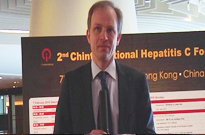 Hepatology Digest:
Hepatology Digest:With increasing of hepatitis C cure rate, clinical doctors will also face a variety of treatment options. What factors determine doctor’ s drug selection?
《国际肝病》:丙型肝炎治愈率提高的同时,临床医生面临多种治疗方案的选择。选择哪种药物或方案治疗,由哪些因素决定?
Prof. Kronenberger:A very important criterion for drug selection is of course genotype. One has to consider the different genotypes - 1a and 1b, and genotypes 2 through 6. A second very important factor is pretreatment status. Failure on a previous treatment is, in general, a negative predictor and this needs to be taken into consideration. A future problem will be the resistance to direct antivirals. We don’t have much experience with this but in the future, resistance to the direct antivirals will certainly play an important role. The fibrosis status is very important; whether the patient has cirrhosis or not. This would determine the approach to treatment. Then there are other factors that might be of extreme importance like HIV co-infection, decompensated liver cirrhosis and liver transplantation.
Kronenberger教授:药物选择的首要标准是基因型。临床医生必须根据患者的HCV基因型做出治疗选择。第二个重要的选择药物的影响因素是治疗前患者的病情,例如患者是否为既往治疗失败者等。虽然目前我们对于DAA药物的耐药问题还没有经验,但是将来这会是影响药物选择的重要因素。另外,肝脏是否有纤维化和肝硬化也非常重要。此外,是否有HIV合并感染、是否为失代偿期肝硬化和肝移植患者等都会影响治疗选择。
Hepatology Digest:In 2014, EASL update the guideline of hepatitis C. New guideline of EASL hepatitis C include all of new drugs which has been approved by EMEA. Six treatment options are available for patients infected with HCV genotype 1. Whether these treatment options have priority?
《国际肝病》:EASL在2014年更新了丙型肝炎指南。在患者推荐治疗方面,新版指南较旧版指南有较大差别,除了方案不同外,每一种基因型有多种治疗选择,例如基因1型患者给出了6种治疗选择,这些治疗选择有无优先顺序?
Prof. Kronenberger:I think the priority should be for the drugs that have robust phase III data. This applies to the combination of sofosbuvir and ledipasvirand the AbbVie 3D combination, which have really robust data and we know when to use ribavirin and when to not use ribavirin and we also have information about treatment duration. A treatment duration of 24-weeks is very expensive and we need solid data as to whether to treat patients for 12- or 24-weeks. Also for genotype 2 there is the sofosbuvir-ribavirin combination that is well established. That would be my priority. Compounds like daclatasvir and simeprevir have only phase II data available so should be second-line options or only used in special situations. But we are awaiting the final data and as soon as we have that, we can use them accordingly. It will also depend on price which will be very important. We should be using the best drug at the cheapest price at that moment.
Kronenberger教授:我认为优先选用哪种药物要根据Ⅲ期临床试验数据来定。对于sofosbuvir+ledipasvir方案和AbbVie 3D方案已经有了试验数据,我们非常清楚什么时候用利巴韦林(RBV),也知道需要治疗的疗程。治疗24周的费用非常高,所以我们需要有确凿的数据支持治疗12周或者24周。对于基因2型患者而言,sofosbuvir+RBV方案可以获得很好的疗效。因此,治疗基因2型患者时,我会优先选择sofosbuvir+RBV方案。而daclatasvir和simeprevir仅有II临床研究的数据,所以仅能作为二线选择或者仅用于特定人群。但是此两药的最终研究数据即将公布,到时两药的应用将有据可依。价格因素也是优选药物的重要因素。我们应该以最便宜的价格使用最好的药物。
Hepatology Digest: Telaprevir and boceprevir have not been recommended in new EASL guideline. Does that mean the two drugs have withdrawn from hepatitis c therapy?
《国际肝病》:EASL的新版指南中,已经没有了特拉匹韦和博赛匹韦的推荐应用。是否意味着两种药物已经退出丙肝治疗领域?
Prof. Kronenberger: Both telaprevir and boceprevir are unfortunately first-line protease inhibitors which have severe problems with dosing and toxicity. We were experiencing so many problems in treatment with these compounds that it was decided that they not be used anymore, not even for financial reasons. The new direct antivirals have a much better safety and tolerability profile and they can be used over shorter durations, so I would recommend not using telaprevir and boceprevir even if they are cheaper than the other compounds.
Kronenberger教授:telaprevir和boceprevir不是一线蛋白酶抑制剂,因为这两种药物有严重的剂量和毒性。我们在临床使用这两种药物时遇到了许多问题,现在不再使用。新的DAA药物的安全性和耐受性很好,且疗程短,所以我不再推荐使用telaprevir和boceprevir,即使这两种药物比其他药物便宜。
Hepatology Digest:The price is the main influencing factor of new drug application. In Europe, whether the price influence hepatitis C new drug application?
《国际肝病》:新药物应用的一个重要影响因素是价格问题,在欧洲价格问题是否影响了丙型肝炎患者接受新的治疗?
Prof. Kronenberger: Yes, price is still a very important factor. I think the price is fair for the 12-week treatment regimens with or without ribavirin. However, it is the price for the 24-week treatment regimens that is much too high. It exceeds possibility and it is here that some correction is necessary. I would like to be in the position of not having to think about price. I would like to be considering efficacy and safety, but as it stands, the 24-week regimens are much too expensive at the moment.
Kronenberger教授:是的,价格仍是一个非常重要的因素。我认为12周联合或不联合RBV方案的成本很公平。然而,24周治疗的成本似乎太高。作为医生,我更愿意考虑疗效和安全性,而不是考虑价格的问题,但是的确目前的24周疗程治疗成本太高。
Hepatology Digest:Direct acting drugs have resistance risk. How to avoid drug resistance?
《国际肝病》:直接抗病毒药物存在耐药风险,临床应该如何避免耐药发生?
Prof. Kronenberger: This is a difficult question. The most important issues in avoiding resistance are to choose the optimal drug combination and patient adherence. You have to motivate the patient to stick to the treatment and not to forget to take their medication. By doing that, I hope we can avoid large-scale resistance development.
Kronenberger教授:这是一个很难回答的问题。最重要的主题是避免耐药的发生,选择最合适的药物联合方案,患者能有很好的依从性。医生必须能够鼓励患者坚持治疗,不能忘记服药。我希望我们能够通过这些措施来避免大量耐药的发生。